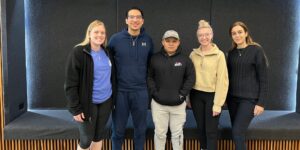HSC College of Pharmacy course project unlocks creativity and innovation
 A pharmacy course project at The University of North Texas Health Science Center at Fort Worth is helping students unlock innovative solutions to some of the greatest challenges facing health care.
A pharmacy course project at The University of North Texas Health Science Center at Fort Worth is helping students unlock innovative solutions to some of the greatest challenges facing health care.
The Innovation Challenge team-based project is part of Dr. Annesha White’s Economic Evaluation and Policy course offered in the fall for second-year student pharmacists. The project is designed to encourage students to create innovative solutions through collaboration and leadership.
“Participating in the Innovation Challenge is an opportunity for students to think outside of the box in the development of solutions to some of today’s most pressing pharmacy and health care challenges through application of the knowledge that they acquire in this course,” said White, associate professor and senior associate dean for assessment, accreditation and faculty success.
White presented the students with more than a dozen project topics, such as medication safety, mental health stigma in the workplace, chronic disease management and food insecurity.
Student teams were asked to select a topic and let the creativity and ideas flow. Most of the 14 teams utilized technology in their solution to impact better health outcomes.
Judges representing the pharmaceutical, insurance and health care industries evaluated the student presentations and selected the top three team ideas.
Ideas that could revolutionize health outcomes
The judges unanimously selected Group 7 as first place for their idea to make nutritional supplements easier to find in stores with a mobile app.
“Our group noticed a problem with prescription medications depleting our patients’ nutrients,” said Elisha McLain, a Group 7 team member. “This is not an uncommon problem, and there are many medications that contribute to the insufficiency of dietary needs. We designed a theoretical software that would be integrated within a community pharmacy to address this need.”
Each time patients pick up their medications at the pharmacy, the program would notify them about the vitamins and minerals they should be taking to ensure they are being supplemented properly for their personal needs.
“We are very excited to have been chosen by the judges,” McLain said. “The most exciting thing for us is to have put our ideas together so seamlessly and have the certificate to show for it, and hopefully our idea can be motivation for others to ‘think outside of the box’ and try to work with our new technological era.”
Group 7 members included Alexis Richardson, Mathew Reyna, Kevin Pham, Sahar Ghorbani, McLain and Patrick Pithua.
Second-place team members in Group 5 included Zach Olson, Mohammad Jafar, Quynh Luu, Joseph Victorian and Nina Ekpono. Their idea addressed the reduction of anaphylaxis of ER patients using a machine learning algorithm.
Group 6 was named third place and included Sara Aldeeb, Nour Dallah, Kristopher Ingram, Emmanuela Mbochafi, Javeria Waheed and Mina William. Their idea addressed medication adherence with a mobile app.
All three winning teams earned a meeting with HSC Next representatives to present their ideas, and if selected, they could receive funding and support to advance their innovation.






Social media